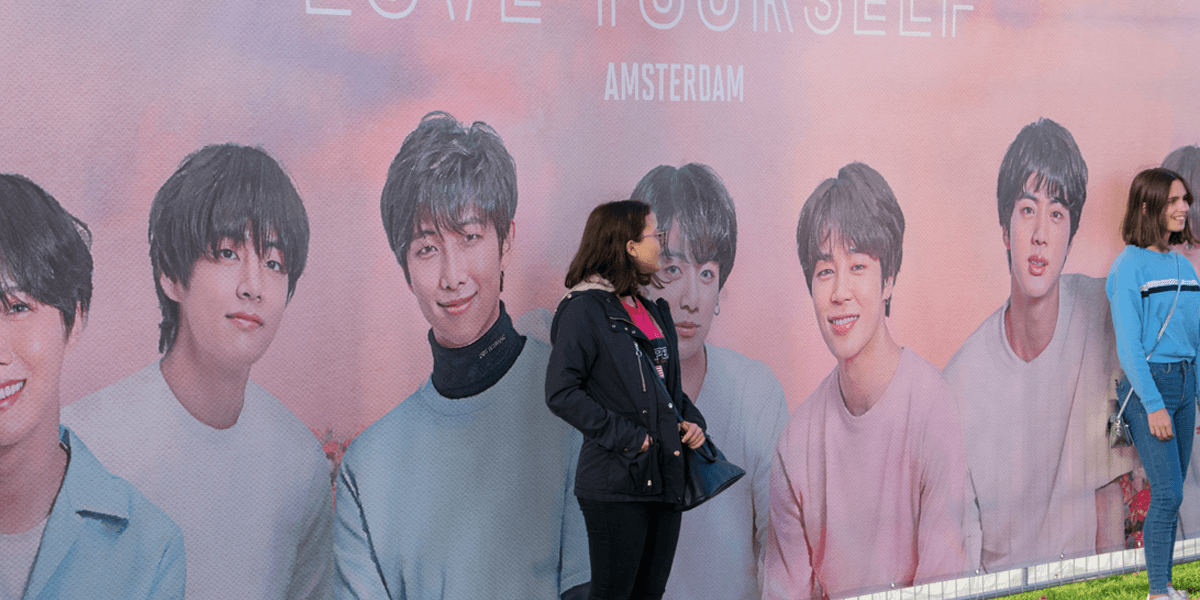
A new USC study explores how fans of K-Pop group BTS helped public health tweets related to COVID-19 go viral. Photo/iStock.
In a world where music superstars make headlines for their chart-topping hits and jaw-dropping performances, a recent study by USC researchers sheds light on a new dimension of their influence: public health. The study, published in Online Social Networks and Media, explores how fans of K-Pop group BTS helped COVID-19 public health messages go viral on Twitter.
According to their research, public health-related tweets that leveraged K-Pop stars generated 111 times more online responses than those that did not. In addition, the inclusion of K-Pop hashtags on Twitter reached regions traditionally underserved by Western public health organizations.
“Entertainers can be a serious force in mobilizing impactful social change,” said lead author Herbert Chang. Chang completed the study as a doctoral candidate in communication at the USC Annenberg School of Communication, with his advisor Emilio Ferrara, a USC Viterbi professor of computer science and communication, and USC communication doctoral candidate Becky Pham.
“Entertainers can be a serious force in mobilizing impactful social change.”
Entertainers drive social change
On August 21, 2020, World Health Organization (WHO) Director-General Tedros Adhanom Ghebreyesus tweeted an unprecedented public health message: he thanked BTS, for encouraging their fans to wear a mask while congratulating the release of their single “Dynamite.”
The tweet went viral, garnering 86.4k likes and 38.6k retweets, making it one of the most shared tweet related to mask-wearing during the COVID-19 pandemic. The boy band’s dedicated fanbase contributed to the tweets’ viral spread, said the researchers.
“Since the start of the pandemic, we were struck by how the simple act of wearing a mask to prevent spreading infection became incredibly politicized and divided among different communities in the US,” said Pham. “So we embarked on this project with a simple question: Who was the strongest voice in promoting mask wearing on Twitter?”
A strategy for targeted interventions
Starting from a massive dataset of 3.5 billion tweets, the team used natural language processing methods to extract more than 7 million tweets related to mask-wearing and K-pop between March 2020 and December 2021.
They refined the dataset into subsets, including tweets containing the hashtag #WearAMask; tweets from important health institutions and figures (such as Dr. Tedros, the WHO, the CDC); tweets containing K-Pop hashtags (#BTS, #BTSArmy) and tweets related to vaccination.
The study found that health-related messages featuring K-Pop stars elicited greater responses from countries in the Global South, which are often underserved by Western-based health organizations, such as South America, Central America, and Southeast Asia. For instance in Vietnam, tweets containing K-pop terms achieved 38.4% more virality than tweets that did not.
This finding aligns with an analysis on X’s official blog, which found that 13 of the top 20 countries tweeting about K-Pop are Southeast Asian and South American states, with BTS taking the number one spot as the most tweeted K-pop artist.
In the US, interior states that are harder to reach on Twitter, such as South Dakota, North Dakota, Mississippi and Utah, experienced the biggest viral boost by percentage. In the study, the researchers observed a 132% to 152% increase compared to usual Twitter activity in these States.
“This shows that we can use this as a strategy for targeted interventions,” said Chang. “It begs the question – in addition to mask wearing, can we use this to potentially increase vaccine uptake or even other health prevention practices?”
While the researchers also explored other groups in relation to COVID-19 health interventions such as Blackpink and Twice, their study shows a staggering 90% of tweets examined were related to BTS.
The publication has garnered recognition from public health officials since its release. In fact, even Ghebreyesus shared the study on the social media platform X, formerly known as Twitter.
New and unforeseen insights
The study is part of a series of COVID-19 social media studies conducted by Ferrara, his students, and researchers at USC Viterbi’s Information Sciences Institute. Ferrara, a renowned expert in social media analysis and misinformation, said his lab released more than 20 papers studying the pandemic and its impact.
“We are keen to uncover new and unforeseen insights from these kinds of studies moving forward.”
With the upcoming 2024 presidential election, Ferrara said his lab is concentrating on examining possible malicious activities in social media that may lead to public deception. Simultaneously, as artificial intelligence becomes increasingly prevalent, their team is determined to tackle the potential adverse impacts of these technologies.
“We’ve been doing studies about social media for over a decade now,” Ferrara said. “We have learned so much over time and we are keen to uncover new and unforeseen insights from these kinds of studies moving forward.”
Published on October 19th, 2023
Last updated on October 31st, 2023













